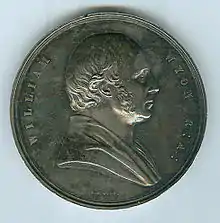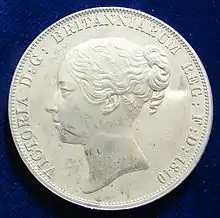William Wyon
William Wyon RA (Birmingham 1795 – 29 October 1851), was official chief engraver at the Royal Mint from 1828 until his death.
-4037.jpg.webp)
-4038.jpg.webp)

Biography
Wyon was born in Birmingham and was apprenticed to his father, a die sinker, in 1809.[1] In 1816, he went to London. He studied the works of John Flaxman, attended the schools of the Royal Academy, and gained a gold medal from the Society of Arts for a copy of the head of Ceres, and a second for an original group. In 1816 he was appointed assistant engraver to the mint, and in 1828 chief engraver. In 1831 he was elected associate and in 1838 full member of the Royal Academy.[2][3] He died in Brighton, United Kingdom.[4] Wyon is buried under a simple rectangular York stone slab at West Norwood Cemetery. He was the father of engraver Leonard Charles Wyon.
Designs
Under the influence of Flaxman, a master of relief sculpture, Wyon was a highly visible proponent of the Neoclassicist vogue.[5]
In 1834 he modelled the head of Princess Victoria, who was 15 years of age at the time. This work was subsequently used for the City Medal struck in 1837 to celebrate Victoria's first visit to the City of London after her accession to the throne[6] and another medal also issued in 1837 commemorating her visit to the Guildhall.[7]
The name of William Wyon is well known among coin and medal collectors because of his prodigious output and artistic skill. He designed the second and third effigies of George IV, the effigy of William IV in 1830, working from the bust by Sir Francis Chantrey,[8] and "The Young Head", which graced Victoria's coinage from 1838 to 1860 on the pennies and the rest of the coinage until 1887.[9] He also designed the Naval General Service Medal, of which 20,933 were issued. Notable among his medallic work are the obverse designs for the prize, juror and other medals for The Great Exhibition at Crystal Palace in 1851, the year of his death in Birmingham.

Wyon's City Medal was the model for the head on the line-engraved postage stamps of 1840–79, beginning with the Penny Black, the world's first adhesive postage stamp, the embossed stamps of 1847–54 and the postal stationery 1841–1901. The primary die used for the embossed issue was engraved by Wyon; the 1s and 10d stamps have the initials "ww" along with the die number at the base of the neck. His design also influenced the surface-printed stamps first printed in 1855.[10]
References
- Wyon, William, L. Forrer, Biographical Dictionary of Medallists, Volume VI, London 1916, p. 650-687.
- Baynes, T. S.; Smith, W.R., eds. (1888). . Encyclopædia Britannica. 24 (9th ed.). New York: Charles Scribner's Sons.
- Wroth, Warwick William (1900). . In Lee, Sidney (ed.). Dictionary of National Biography. 63. London: Smith, Elder & Co.
- Rines, George Edwin, ed. (1920). . Encyclopedia Americana.
- M. Jones, "The life and work of William Wyon", in La medaglia neoclassica in Italia e in Europa : atti del quarto Convegno internazionale di studio sulla storia della medaglia, 20–23 giugno 1981: Palazzo Belgrado/Palazzo del Torso/Aula magna del CISM, Udine, CIAC libri, 1984, pp. 119–40; as cited "Silver frosted bronze medal of St. Thomas's Hospital, by William Wyon: The Cheselden Medal", British Museum. On line. Archived 18 October 2015 at the Wayback Machine
- "Wyon City Medal (1837) and the Penny Black (1840)", Images of the World Archived 9 May 2008 at the Wayback Machine
- Visit of Queen Victoria to the Guildhall
- see Carlisle, 'Memoir', quoted below at Biography
- James C. Johnston Jr., "Victoria Regina", Journal of Antiques and Collectibles (April, 2005)
- "Great Britain Victorian Stamps", Images of the World Archived 21 March 2012 at the Wayback Machine
Bibliography
External links
| Preceded by Jean Baptiste Merlen |
Coins of the pound sterling Obverse sculptor 1825 |
Succeeded by Leonard Charles Wyon |
| Wikimedia Commons has media related to William Wyon. |